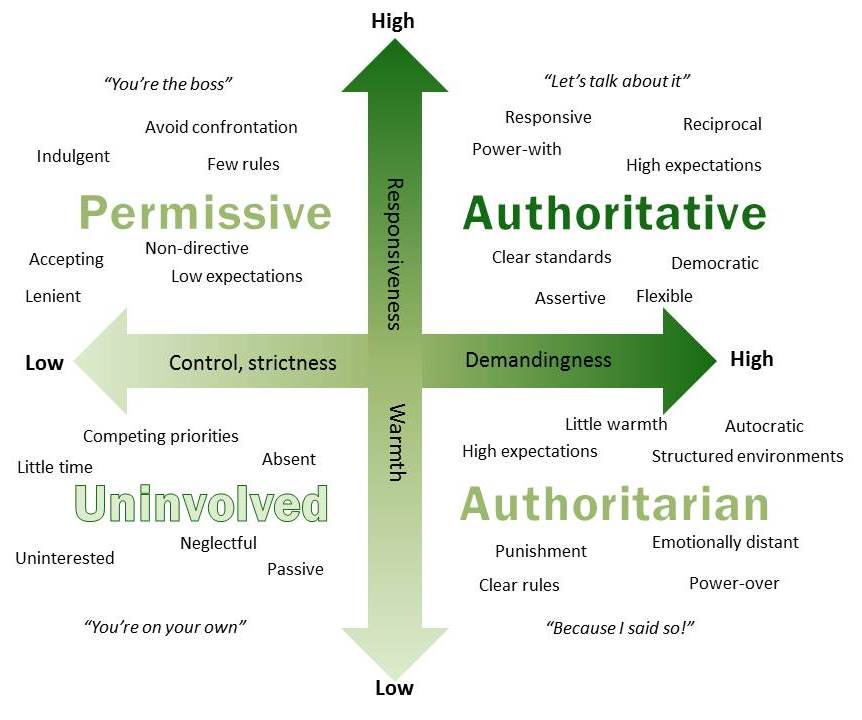
Parenting is like cooking a pot of soup – each parent brings their own ingredients, and sometimes, the flavors clash. When it comes to raising kids, parents often have different styles. These differences can lead to misunderstandings, conflicts, and stress. But with the right approach, you can address these differences and create unity in your family. Here’s a guide to help you navigate the world of diverse parenting styles.
Understanding Parenting Styles
The Four Main Parenting Styles

Understanding the different parenting styles is the first step in addressing any differences. The four main styles are:
Authoritative Parenting
Authoritative parenting is often seen as the ideal style. These parents balance high expectations with emotional responsiveness. They set clear standards but are also supportive and communicative.
Characteristics of Authoritative Parents
- High expectations: They expect a lot from their children but provide the necessary resources and support.
- Warmth and nurturance: These parents are highly involved in their children’s lives and show a lot of affection.
- Open communication: They encourage dialogue and allow their children to express their opinions.
Impact on Children
Children raised by authoritative parents tend to be more independent, self-reliant, and socially adept. They often excel academically and exhibit lower levels of depression and anxiety.
Authoritarian Parenting
Authoritarian parents emphasize obedience and discipline. They have high expectations and enforce strict rules without room for negotiation or input from their children.
Characteristics of Authoritarian Parents
- Strict rules: These parents establish rigid rules and expect obedience without question.
- Low warmth: There is less warmth and nurturing in this style. Communication is often one-way.
- High expectations: Expectations are high, but without the same level of support as authoritative parents.
Impact on Children
Children with authoritarian parents may follow rules well but can struggle with self-esteem. They might be obedient and proficient but often lack social competence and are more prone to anxiety and depression.
Permissive Parenting
Permissive parents are indulgent. They are very responsive to their children’s needs but lack the expectation and discipline of other styles.
Characteristics of Permissive Parents
- High responsiveness: They are very loving and nurturing.
- Few demands: There are few rules or expectations for behavior.
- Friend-like relationship: They often act more as a friend than a parental figure.
Impact on Children
Children raised by permissive parents might struggle with authority and discipline. They often exhibit higher levels of aggression and may face difficulties in school due to a lack of boundaries and expectations.
Uninvolved Parenting
Uninvolved parents, also known as neglectful parents, are characterized by a lack of responsiveness and involvement in their children’s lives.
Characteristics of Uninvolved Parents
- Low involvement: They provide little guidance, nurturing, or attention.
- Minimal interaction: They are often indifferent to their children’s needs and activities.
- Few demands: There are minimal expectations for behavior and achievements.
Impact on Children
Children with uninvolved parents often struggle with self-esteem issues and exhibit poor academic performance. They can have trouble forming emotional attachments and are more likely to face behavioral problems.
Understanding these styles helps in identifying where you and your partner stand and how you can merge your approaches for the betterment of your family. Each style carries its own set of potential strengths and challenges, and recognizing these can be the first step in creating a balanced and nurturing environment for your children.
The Importance of Recognizing Your Parenting Style
Understanding your parenting style is like knowing your cooking style. Are you a strict recipe follower or do you improvise with what’s in the fridge? Recognizing your style helps you understand your approach and its effects on your children.
Self-Awareness and Reflection: Self-awareness is the cornerstone of effective parenting. When you recognize your parenting style, you become more aware of your behaviors, strengths, and areas needing improvement. This self-reflection helps you understand how your actions influence your child’s development.
Understanding Your Impact: Each parenting style has a unique impact on children. Knowing your style helps you comprehend how your behavior shapes your child’s emotional and psychological growth. For example, authoritative parenting often leads to self-reliant and socially adept children, while authoritarian parenting can lead to obedience but also anxiety and lower self-esteem.
Identifying Strengths and Weaknesses: Recognizing your parenting style allows you to identify its strengths and weaknesses. This insight enables you to maintain the positive aspects of your approach while working on areas that might negatively affect your child.
Facilitating Better Communication: Understanding your parenting style can improve communication with your partner. When both parents know their styles, they can discuss differences more constructively and find common ground. This open communication is vital for co-parenting and creating a cohesive family environment.
Setting Realistic Expectations: Parents who recognize their styles can set more realistic expectations for themselves and their children. For instance, if you know you’re more permissive, you might realize the need to set clearer boundaries, while authoritarian parents might work on being more responsive and nurturing.
Adaptability and Flexibility: Parenting is not a one-size-fits-all approach. Recognizing your style enables you to adapt and be flexible according to your child’s needs and circumstances. It empowers you to blend different elements from various styles to suit specific situations.
Enhancing Parental Confidence: When you understand your parenting style, you feel more confident in your decisions and actions. This confidence stems from knowing the rationale behind your approach and being aware of its potential impacts.
Fostering a Positive Family Dynamic: A deep understanding of your parenting style can lead to a more harmonious family environment. When parents are mindful of their approaches, they can align their strategies, reduce conflicts, and create a more positive atmosphere for their children.
More The Importance of Recognizing Your Parenting Style
- Supporting Child Development: Children thrive in stable, predictable environments. Recognizing your parenting style helps you create such an environment by providing consistent guidance and support tailored to your child’s unique needs.
- Encouraging Personal Growth: Recognizing and understanding your parenting style encourages personal growth. It challenges you to reflect on your behaviors and make necessary changes to become a better parent and individual.
- Building Stronger Parent-Child Relationships: Awareness of your parenting style fosters stronger relationships with your children. It allows you to understand their reactions and needs better, facilitating more meaningful interactions and emotional connections.
- Guiding Educational Choices: Your parenting style can influence your child’s educational experiences. Recognizing your approach helps you support your child’s learning in ways that align with their strengths and challenges.
- Preparing for Future Parenting Challenges: Parenting is an evolving journey. Understanding your style prepares you for future challenges as your child grows. It equips you with the tools to adapt your approach as needed.
- Promoting Emotional Well-being: Children’s emotional well-being is closely tied to their parents’ approaches. Recognizing your parenting style helps you provide the emotional support and stability your child needs to flourish.
- Contributing to Society: Parents play a crucial role in shaping the next generation. Understanding your parenting style allows you to raise well-rounded individuals who can positively contribute to society.
Recognizing your parenting style is not just about labeling yourself but about understanding the deeper implications of your actions and decisions. This awareness is the first step towards intentional, effective, and nurturing parenting. It lays the foundation for a harmonious family life and fosters an environment where children can grow and thrive.
Injury Prevention: Common Workout Mistakes and How to Avoid Them
Addressing Differences in Parenting Styles
Communicate Openly and Honestly
Communication is key. Sit down with your partner and discuss your parenting philosophies. Open, honest conversations can help you understand each other’s perspectives and find common ground.
Identify Common Goals
Focus on what you both want for your children. Identify your common goals, whether it’s fostering independence, ensuring academic success, or nurturing kindness. Shared goals can help you align your approaches.
Be Willing to Compromise
Sometimes, you’ll need to meet in the middle. Be willing to compromise and find solutions that incorporate both of your parenting styles. Flexibility is essential.
Techniques for Creating Unity

Establish Consistent Rules and Routines
Consistency is crucial for children’s development. Agree on a set of rules and routines that both parents will enforce. This creates a stable and predictable environment for your kids.
Present a United Front
Children are experts at detecting and exploiting differences. Always present a united front. Discuss disagreements in private, away from the kids.
Support Each Other
Parenting is a team effort. Support your partner’s decisions and back each other up. This not only strengthens your partnership but also provides a stable foundation for your children.
Understanding the Impact on Children
The Benefits of a Unified Approach
A unified parenting approach can have numerous benefits for children. It creates a secure environment, fosters emotional stability, and promotes healthy development.
The Consequences of Inconsistency
Inconsistent parenting can lead to confusion, anxiety, and behavioral issues in children. It’s important to address differences to provide a consistent upbringing.
Managing Conflict

Addressing Disagreements
Disagreements are inevitable, but how you handle them matters. Use conflict resolution techniques to address disagreements constructively. Avoid blame and focus on solutions.
Seeking Professional Help
If conflicts persist and affect your family dynamics, don’t hesitate to seek professional help. Family counselors can provide valuable insights and strategies.
The Hidden Dangers of Artificial Intelligence: Job Displacement and Existential Risks
Conclusion
In this blog post, you have discover the differences in parenting styles and learned how to address them to create unity in your family. By understanding the four main parenting styles, communicating openly with your partner, and establishing consistent rules, you can foster a harmonious family environment. let us know what you think in the comment below.
FAQs
- How do I know my parenting style?: Reflect on your approach to discipline, communication, and nurturing. Your dominant characteristics will indicate your parenting style.
- Can parenting styles change?: Yes, parenting styles can evolve over time, especially as parents gain new insights and experiences.
- What if my partner and I can’t agree on a parenting approach?: Focus on open communication, compromise, and seek professional guidance if needed.
- How do different parenting styles affect children?: Different styles can lead to varied outcomes in children, from emotional stability to behavioral issues.
- What are some common goals to align on with my partner?: Common goals include fostering independence, academic success, emotional well-being, and kindness.

